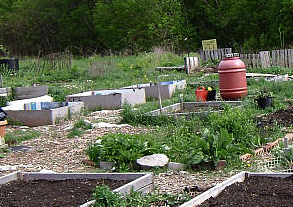Exciting news is sprouting up at the Maloca Community Garden, a plot on campus devoted to sustainable living practices through individual and communal gardens.

The garden, run by the Faculty of Environmental Studies (FES) Maloca Community Garden Club, strives to create an environment for multicultural and intergenerational learning and sharing through agricultural practices.
Environmental and community advocate Regenesis recently joined forces with Maloca Community Garden to hold a campus cleanup day at York University’s Keele campus, where members and volunteers helped dispose of trash and debris. Participants also laid down new trails along the interior garden path to create new gardening space.
The Growing Good Community Farm, a grassroots food justice initiative focused on decolonizing food access and addressing the food desert conditions existing in the surrounding community, is also being recognized for its efforts at Maloca.

The program, developed in partnership by FES and concerned black farmers in the Jane and Finch community (Toronto Black Famers and Growers Collective), is brokered by MES alumnus Damian Adjodha and gives interested parties an opportunity for a practical learning experience in agroecology.
For the past two summers, FES students and community members have been able to participate in a course taught by Adjodha, titled “Growing Good – Community Engaged Action Learning in Agroecology.”
“The course is offered at the master’s level and is a blend of hands-on practical training, systems thinking and community food sovereignty conversation,” said Adjodha, an experienced organic farmer of 15 years.
The intent of the program is to teach these skills, and also build capacity around food justice and food access by teaching community members how to produce their own food. Adjodha uses agroecological approaches and indigenous land management principles from around the globe to engage marginalized communities in their environment.
Since the Jane and Finch community is home to a variety of immigrants and low-income populations, community farmers from racialized groups also have access to grow food at the farm for their own economic security. The farm has produced an abundance of bumper crops of food including zucchini, salad greens, callaloo and bok choy.
FES PhD student Deidre Walton spearheaded a donation program with the help of the York University Black Students Alliance and the York Federation of Students Food Bank to deliver the surplus of produce to those in need.

To date, the farm has donated over a hundred bags for food to community members.
Walton has also initiated a fundraising project to make the farm self-sustaining, and she is working with Adjodha on a plan to move the farm to a self-sustaining social enterprise model that ties in with her PhD research.
To support Growing Good’s efforts to create food security and food justice in the greater Jane and Finch community, visit its produce table Mondays in the Health, Nursing & Environmental Studies Building lobby from 11am to 2pm
For more information, contact Walton at d-lishus@unforgettable.com or Adjodha at damian.adjodha@gmail.com.
The Maloca Community Garden, located south of The Pond Road between the Passy Crescent Lot and Hoover Road, is affiliated with the Toronto Community Garden Network, the Toronto Seed Library and Regenesis. It was established in 1999 by FES alumna Angela Franco (BES ’98, MES ’00) as a graduate research project to give students and York community members an opportunity to grow and harvest their own food.
Franco is currently working as the community research and program developer at the Real Food 4 Life Education Foundation.
“I am pleased to be reconnected with current Maloca student coordinators so many years later, and look forward to joining the movement to revision and advocate for the garden’s future on campus,” she said.
Membership to the garden is open to students, staff, faculty and anyone in the surrounding community. Contact maloca.yorku@gmail.com for more information on becoming a member or getting involved.


